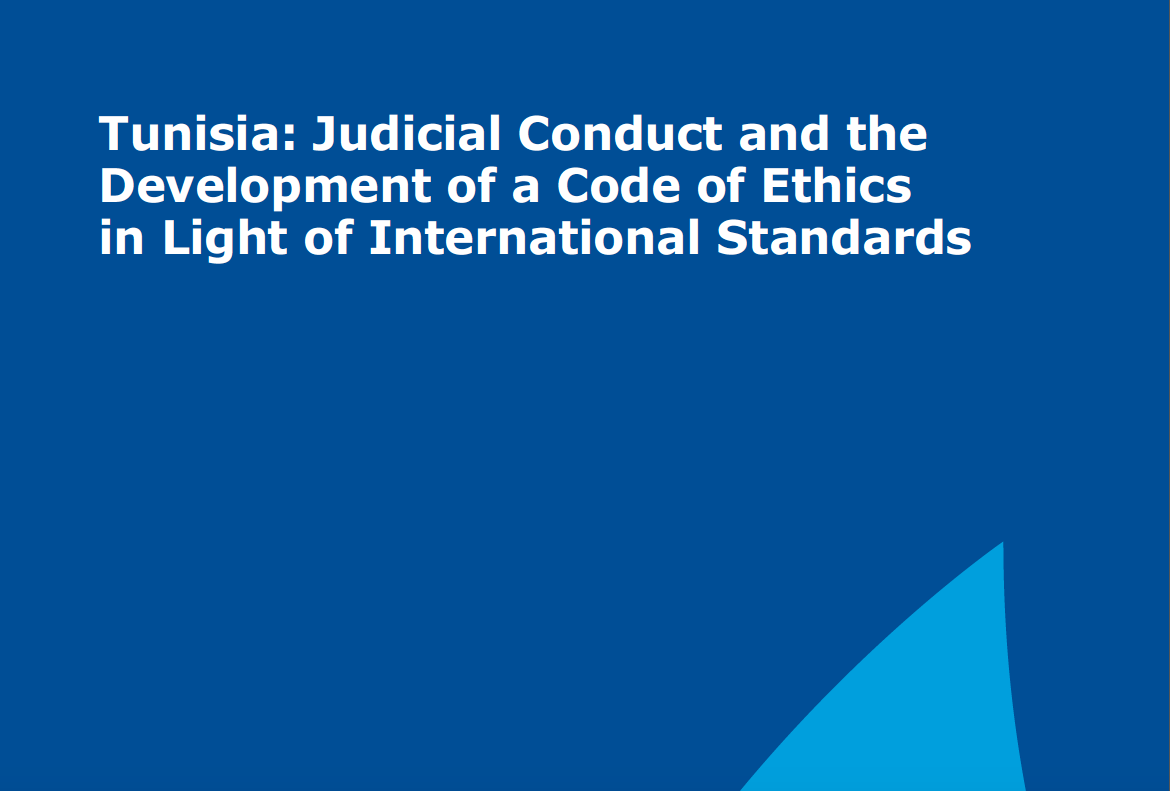Tunisian authorities must ensure that the process of developing and adopting a Judicial Code of Ethics and Judicial Conduct in the country is inclusive and transparent, said the ICJ in a briefing paper released today in Tunis.
The Code must also align with international standards and be effectively and independently implemented to secure judicial independence and accountability, the memo Tunisia: Judicial Conduct and the Development of a Code of Ethics in Light of International Standards (available in English and Arabic), adds.
In the paper, the ICJ recommends the adoption of a clear, transparent and inclusive procedure for developing and adopting the Judicial Code, and for its content to conform to the UN-endorsed Bangalore Principles of Judicial Conduct.
“Adopting a Code of Ethics and Judicial Conduct is a unique opportunity for Tunisian authorities to bolster judicial independence and restore public confidence in judicial institutions,” said Saïd Benarbia, Director of the Middle East and North Africa Programme at the ICJ.
“The authorities should get both the process and the content right, and ensure that such a code provides detailed guidance to judges on what kind of conduct is expected of them,” he added.
The adoption of a Code of Ethics has the potential to remedy the shortcomings of the current legal framework on judicial independence and accountability.
Organic Law No. 67-29 on the Judiciary, the High Judicial Council and the Statute for Judges, even as modified by Organic Law No. 2013-13, does not adequately or sufficiently provide for the guarantees to uphold judicial individual independence, the criteria and procedures for recusal or disqualification, or the need to avoid use of one’s office for private gain.
This is particularly problematic given that the current disciplinary procedures are inconsistent with international standards and best practices for judicial independence and impartiality, including because of the role of the Minister of Justice in initiating such procedures.
Against this background, the ICJ calls on the Tunisian authorities to:
- Ensure that the Judicial Code is established in law as the basis on which judges will be held to account professionally;
- Ensure that the principles of independence, impartiality, integrity, propriety, equality, competence and diligence are clearly incorporated in the Judicial Code of Ethics in accordance with the Bangalore Principles and other relevant international standards;
- Amend Organic Law No. 67-29 to ensure that judges in Tunisia enjoy personal immunity from civil suits for monetary damages for improper acts or omissions in the exercise of their judicial functions; instead, in appropriate cases, persons who suffer losses as a result of such improper acts or omissions should be able to make a claim for compensation against the State itself;
- Ensure that the law and the Judicial Code clearly and precisely define the forms of misconduct that may lead to a judge’s discipline;
- Provide, in a manner consistent with independence of the judiciary, for individual judges to be held responsible, through disciplinary or criminal proceedings or both as appropriate, for perpetration of or complicity in violations of human rights, international humanitarian law and for judicial corruption; in this regard clearly prescribe the offences that could give rise to disciplinary liability for such acts or omissions, in line with international law and standards; and
- Ensure, in defining grounds for disciplinary action, that the fundamental rights and freedoms of judges are upheld and respected.
Contact
Saïd Benarbia, Director of the ICJ Middle East and North Africa Programme, t: +41.22.979.3817, e: said.benarbia(a)icj.org
Additional information
ICJ Commissioner Martine Comte led the delegation that met with different Tunisian authorities and justice actors this week in Tunis in order to present ICJ’s memo and discuss its findings and recommendations. The ICJ delegation met with Mr. Youssef Bouzeker, President of the Tunisian High Judicial Council, and other senior officials of the Tunisian Ministry of Justice and of the Tunisia Bar Association.
Tunisia-Code of Ethics-Advocacy-Analysis Brief-2016-ENG (full paper, in PDF)
Tunisia-judicial code-news-press release-2019-ARA (full story, Arabic version, in PDF)
Tunisia-Code of Ethics-Advocacy-Analysis Brief-2016-ARA (full paper, Arabic version, in PDF)

